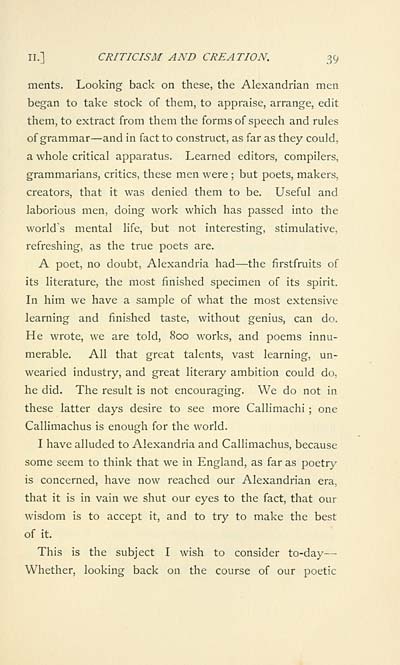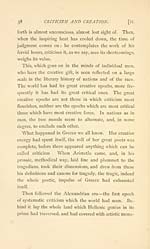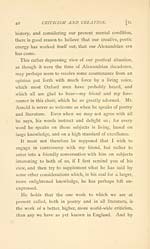Download files
Complete book:
Individual page:
Thumbnail gallery: Grid view | List view

II.] CRITICISM AND CREATION, 39
ments. Looking back on these, the Alexandrian men
began to take stock of them, to appraise, arrange, edit
them, to extract from them the forms of speech and rules
of grammar — and in fact to construct, as far as they could,
a whole critical apparatus. Learned editors, compilers,
grammarians, critics, these men were ; but poets, makers,
creators, that it was denied them to be. Useful and
laborious men, doing work which has passed into the
world's mental life, but not interesting, stimulative,
refreshing, as the true poets are.
A poet, no doubt, Alexandria had — the firstfruits of
its literature, the most finished specimen of its spirit.
In him we have a sample of what the most extensive
learning and finished taste, without genius, can do.
He wrote, we are told, 800 works, and poems innu-
merable. All that great talents, vast learning, un-
wearied industry, and great literary ambition could do,
he did. The result is not encouraging. We do not in
these latter days desire to see more Callimachi ; one
Callimachus is enough for the world.
I have alluded to Alexandria and Callimachus, because
some seem to think that we in England, as far as poetry
is concerned, have now reached our Alexandrian era,
that it is in vain we shut our eyes to the fact, that our
wisdom is to accept it, and to try to make the best
of it.
This is the subject I wish to consider to-day —
Whether, looking back on the course of our poetic
ments. Looking back on these, the Alexandrian men
began to take stock of them, to appraise, arrange, edit
them, to extract from them the forms of speech and rules
of grammar — and in fact to construct, as far as they could,
a whole critical apparatus. Learned editors, compilers,
grammarians, critics, these men were ; but poets, makers,
creators, that it was denied them to be. Useful and
laborious men, doing work which has passed into the
world's mental life, but not interesting, stimulative,
refreshing, as the true poets are.
A poet, no doubt, Alexandria had — the firstfruits of
its literature, the most finished specimen of its spirit.
In him we have a sample of what the most extensive
learning and finished taste, without genius, can do.
He wrote, we are told, 800 works, and poems innu-
merable. All that great talents, vast learning, un-
wearied industry, and great literary ambition could do,
he did. The result is not encouraging. We do not in
these latter days desire to see more Callimachi ; one
Callimachus is enough for the world.
I have alluded to Alexandria and Callimachus, because
some seem to think that we in England, as far as poetry
is concerned, have now reached our Alexandrian era,
that it is in vain we shut our eyes to the fact, that our
wisdom is to accept it, and to try to make the best
of it.
This is the subject I wish to consider to-day —
Whether, looking back on the course of our poetic
Set display mode to: Large image | Transcription
Images and transcriptions on this page, including medium image downloads, may be used under the Creative Commons Attribution 4.0 International Licence unless otherwise stated. ![]()
| Early Gaelic Book Collections > Ossian Collection > Aspects of poetry > (55) |
|---|
| Permanent URL | https://digital.nls.uk/78385932 |
|---|
| Description | Selected books from the Ossian Collection of 327 volumes, originally assembled by J. Norman Methven of Perth. Different editions and translations of James MacPherson's epic poem 'Ossian', some with a map of the 'Kingdom of Connor'. Also secondary material relating to Ossianic poetry and the Ossian controversy. |
|---|
| Description | Selected items from five 'Special and Named Printed Collections'. Includes books in Gaelic and other Celtic languages, works about the Gaels, their languages, literature, culture and history. |
|---|

